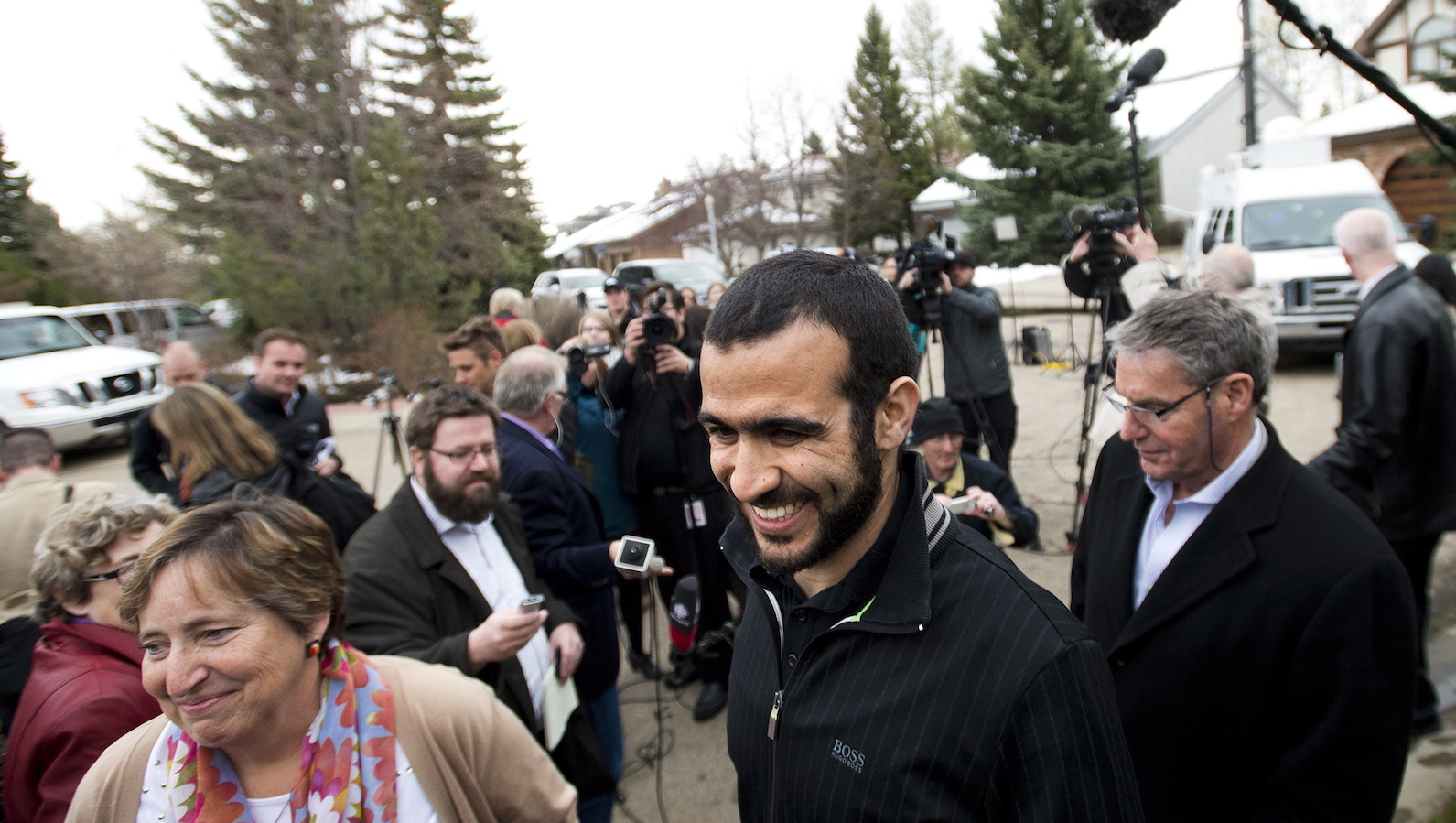Is Omar Khadr allowed to board an airplane?
The answer will depend on the government’s no-fly database, a heavily guarded top-secret registry
Omar Khadr smile as he finishes speaking to the media outside his new home after being granted bail in Edmonton on Thursday, May 7, 2015. THE CANADIAN PRESS/Nathan Denette
Share

Omar Khadr could be in for a very long bus ride.
The former Guantanamo Bay prisoner won yet another court challenge on Friday, convincing an Edmonton judge that he should be allowed to take a two-week trip to Toronto to visit relatives, including his ailing grandmother. Justice June Ross also ruled that Khadr, freed on bail four months ago, no longer needs to wear an electronic monitoring bracelet.
But whether Khadr actually makes it to the city of his birth is no guarantee. It’s entirely possible (if not probable) that the 29-year-old is on Canada’s no-fly list—and he won’t know for sure unless he purchases a plane ticket and tries to check in at the Edmonton International Airport. There is no mechanism in place for would-be travellers to find out, in advance, if they’re banned from Canadian skies. “Our plan is to make a request to determine whether he’s on the list,” says Nate Whitling, one of Khadr’s longtime lawyers. “But I don’t think there is any other way to know except to buy a plane ticket and get turned away at the gate.”
Known officially as the “Specified Persons List,” the no-fly database is a top-secret registry overseen by senior members of the RCMP, the Canadian Security Intelligence Service (CSIS) and Transport Canada. The content is so heavily guarded that the federal government won’t even reveal how many names it includes (educated estimates range from 500 to 2,000). What is certain, though, is that the bar for inclusion is nowhere near the burden of proof required for, say, a criminal conviction. To be listed, authorities must possess merely a “reasonable suspicion” that a person is a threat to transportation security, or attempting to travel abroad to commit a terrorist offence.
To date, the public knows of only one person—a Montreal man named Hani Al Telbani—who has been denied boarding under the authority of Canada’s no-fly list.
Does Omar Khadr fit the no-fly criteria? Even his own lawyer thinks he likely does, at least technically speaking. “I am guessing, frankly, that he’s probably on the list,” Whitling tells Maclean’s. “And I’m guessing that he’s probably there because of the fact he’s been convicted of these offences.”
Those convictions, of course, are at the heart of Khadr’s now-familiar—and ever-polarizing—legal odyssey. The 15-year-old son of a senior al-Qaeda associate, he was shot and captured on an Afghanistan battlefield in July 2002 and accused of tossing a grenade that mortally wounded a U.S. soldier, Sgt. 1st Class Christopher Speer. Transferred to the American prison camp at Guantanamo Bay, Cuba, where he spent the next ten years of his young life, Khadr eventually pleaded guilty to five so-called war crimes, including murder in a combat zone. In his own statement of facts, the cornerstone of his guilty plea, Khadr admitted that he was a teenage member of Osama bin Laden’s terrorist network, was obsessed with killing Americans “anywhere they can be found,” and that the “proudest moment of his life” was building and planting improvised explosive devices aimed at the boots of coalition troops. When prison guards gave him a hard time, Khadr would recall how his grenade killed their comrade “and it would make him feel good.”
He now insists those facts are absolute fiction, and that he only agreed to the plea deal so he could secure a transfer to a Canadian prison. Now home, Khadr has since launched an appeal of those convictions at a special military court in Virginia, paving the way for his May 7 release on bail, pending the ruling. The day he was set free, he told a crush of reporters in Edmonton that he wants a “fresh start,” a chance for people to “see who I am as a person, not as a name.”
But free to walk the streets does not necessarily mean free to fly. The Minister of Public Safety—Steven Blaney, a man who has repeatedly described Khadr as a dangerous, hardened terrorist—ultimately approves every addition to the no-fly list. And considering the low threshold required for inclusion (again, “reasonable grounds to suspect”), Khadr’s signed statement of facts, bogus or not, may be more than enough. “It is a very low legal standard, so given that Omar has been convicted I’m not going to be shocked if it turns out he’s on the list,” Whitling says. “And if so, we may have to challenge it.”
Asked if his client poses a threat to fellow airline passengers, Whitling is adamant: “Not in the least.” But here’s the problem for Khadr’s defence team: Justice Ross says he must take his trip to Toronto before the end of 2015 (in the company of his other lawyer, Dennis Edney), and if Khadr is indeed on the no-fly list, it would take a lot longer than three months to mount the necessary legal challenge.
In the meantime, Whitling says Khadr’s grandmother is terminally ill and desperate to see her grandson one last time after so many years in custody. “The visit is going to have to happen,” he says. “Whether it’s by bus, a car, a plane or a train, it’s going to have to happen.”
Like all things Khadr, to be continued.